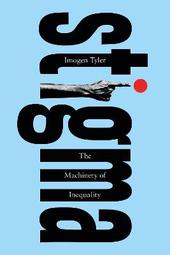
|
Stigma: The Machinery of Inequality
Paperback / softback
Main Details
| Title |
Stigma: The Machinery of Inequality
|
| Authors and Contributors |
By (author) Imogen Tyler
|
| Physical Properties |
| Format:Paperback / softback | | Pages:384 | | Dimensions(mm): Height 234,Width 156 |
|
| Category/Genre | Economic theory and philosophy
Political economy
Economic systems and structures |
|---|
| ISBN/Barcode |
9781350379275
|
| Classifications | Dewey:302 |
|---|
| Audience | | Professional & Vocational | |
|---|
|
Publishing Details |
| Publisher |
Bloomsbury Publishing PLC
|
| Imprint |
Bloomsbury Academic
|
| Publication Date |
10 November 2022 |
| Publication Country |
United Kingdom
|
Description
Stigma is a corrosive social force by which individuals and communities throughout history have been systematically dehumanised, scapegoated and oppressed. From the literal stigmatizing (tattooing) of criminals in ancient Greece, to modern day discrimination against Muslims, refugees and the 'undeserving poor', stigma has long been a means of securing the interests of powerful elites. In this radical reconceptualisation Tyler precisely and passionately outlines the political function of stigma as an instrument of state coercion. Through an original social and economic reframing of the history of stigma, Tyler reveals stigma as a political practice, illuminating previously forgotten histories of resistance against stigmatization, boldly arguing that these histories provide invaluable insights for understanding the rise of authoritarian forms of government today.
Author Biography
Imogen Tyler is a Professor of Sociology at Lancaster University and a Fellow of the Academy of Social Science. A teacher, writer and social activist, she is a member of the Morecambe Bay Poverty Truth Commission and a trustee of the UK Poverty Truth Network. She has published widely on issues of social inequality and injustice, and her critically acclaimed book Revolting Subjects (2013) was shortlisted for the Bread and Roses Award for Radical Publishing.
ReviewsHistorically, when people were physically branded and maimed, it was clear who was creating stigma and why. While such practices are rare today, Tyler (Lancaster Univ., UK) argues that powerful, hidden processes in developed modern societies still create stigma ... Chapters include an analysis of race and Black power in the US, the European refugee crisis, poverty within austerity Britain (based partly on her work with a local Poverty Truth Commission), and autobiographical insights from her working-class upbringing ... [The] analysis of oppression in other places can provide a more acceptable way to explore dynamics that also apply to the US. Summing Up: Recommended. Lower-division undergraduates through faculty. * CHOICE * A profoundly original and innovating book. By giving voice to the dehumanised, Tyler's book powerfully bears witness to the suffering and tragedy unfolding in our age. Historically attentive and theoretically sophisticated... intellectually rich and elegantly written. * Satnam Virdee, University of Glasgow * A devastating and brilliant book that reconceptualises stigma for the Twenty-First Century. Tyler skewers austerity and border regimes, laying out their human costs with clear-eyed, thoughtful analysis. Stigma is essential reading for these times. * Emma Jackson, Goldsmiths * If you think you know what stigma is, think again. This book is essential reading for anyone hoping to understand the roots of stigma in our society and how it is leveraged to embed inequities. * Mary O'Hara * Imogen Tyler's passionate book brings out the enduring power of stigma to mark inequality on the body in profound, searing ways. This will be a vital contribution to recognising the lived experience of inequality across history. * Mike Savage, London School of Economics *
|